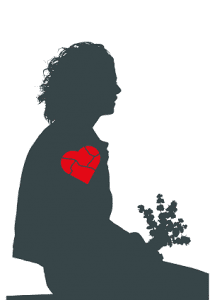
For centuries, the heart was regarded as the center of emotions. Cultures all over the world believed that the fist-sized organ was the source of emotions, motivation and, in many cases, the home of the soul. Modern medicine proved that wrong. Emotions and motivations come from the brain. The heart has nothing to do with it at all, right?
Wrong. An increasing amount of evidence suggests that while emotions may not come from our hearts, they have a great deal of effect on it. Emotional distress, for example, has been shown to cause the same maladaptive heart rhythm that occurs during the adrenaline rush of the “fight-flight-freeze” reflex. Blood pressure rises at the same time that blood vessels constrict and the heart rate soars leading to minor to moderate bodily damage.
The heart does not just take a beating when a person panics or is in sudden, acute distress either. Grief and stress have both been shown to cause serious problems for the cardiovascular system. The poster child for the unpleasant effects of grief or stress is takotsubo cardiomyopathy or the ominous “broken heart syndrome.”
Takotsubo cardiomyopathy is caused almost solely by severe stress. The stress may be acute, such as the sudden death of a loved one, or chronic, such as from being consistently overworked. Eventually, this stress weakens or “stuns” the left ventricle, the largest of the heart’s four chambers. The ventricle subsequently enlarges and changes shape as the muscle around it thins. The new shape of the ventricle resembles a takotsubo, the Japanese octopus-trapping pot. It is from this shape that the disorder gets its name.
Takotsubo cardiomyopathy sometimes resolves itself when the stress dissipates, such as if someone comes to terms with a loved one’s death. If the stressor continues or the disorder is left unresolved, takostubo cardiomyopathy can lead to lethal arrhythmias and heart failure. Unfortunately, takotsubo cardiomyopathy often goes undiagnosed until it becomes dangerous and begins to create symptoms that mimic those of myocardial infarction, a traditional heart attack caused by blocked blood vessels.
Why exactly our emotions have so much effect on the heart is still under investigation. The good news is that researchers have found evidence that just as negative emotions harm the heart, positive emotions can help heal it. The relationship between emotions of all kinds and the cardiovascular system may not be well understood yet, but the basic trend is clear. In the case of both the metaphorical heart and the physical one, it pays to be happy.


